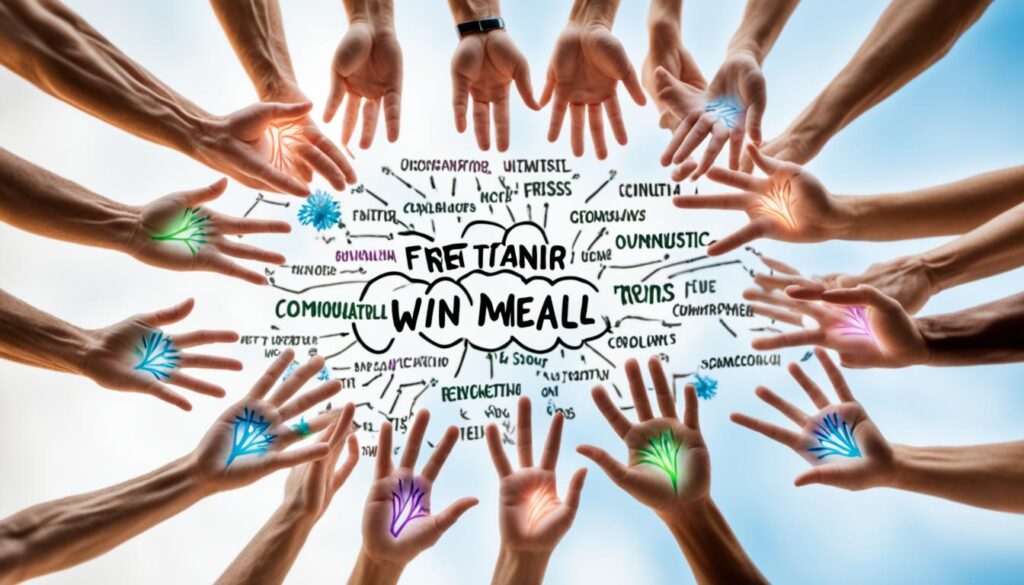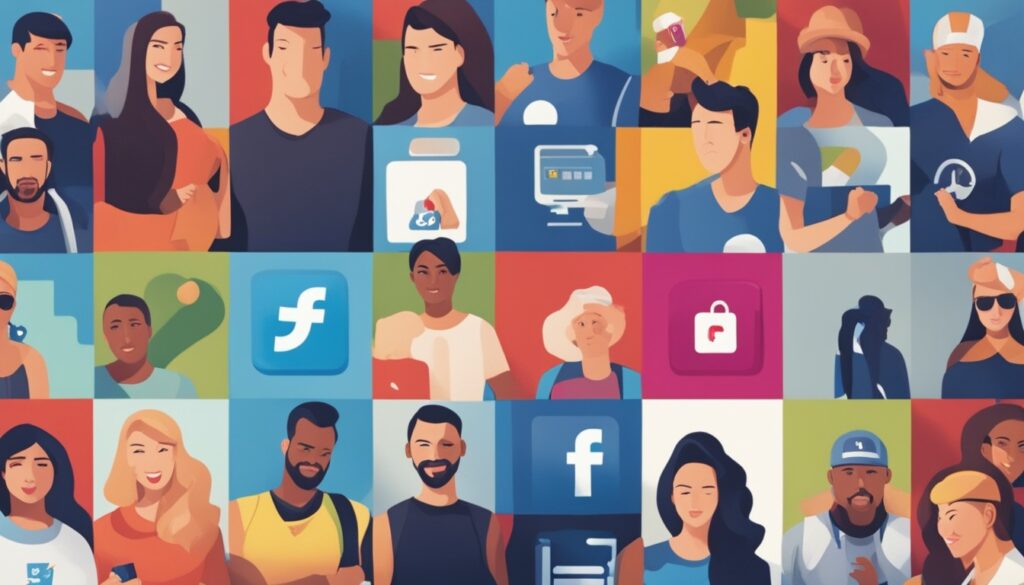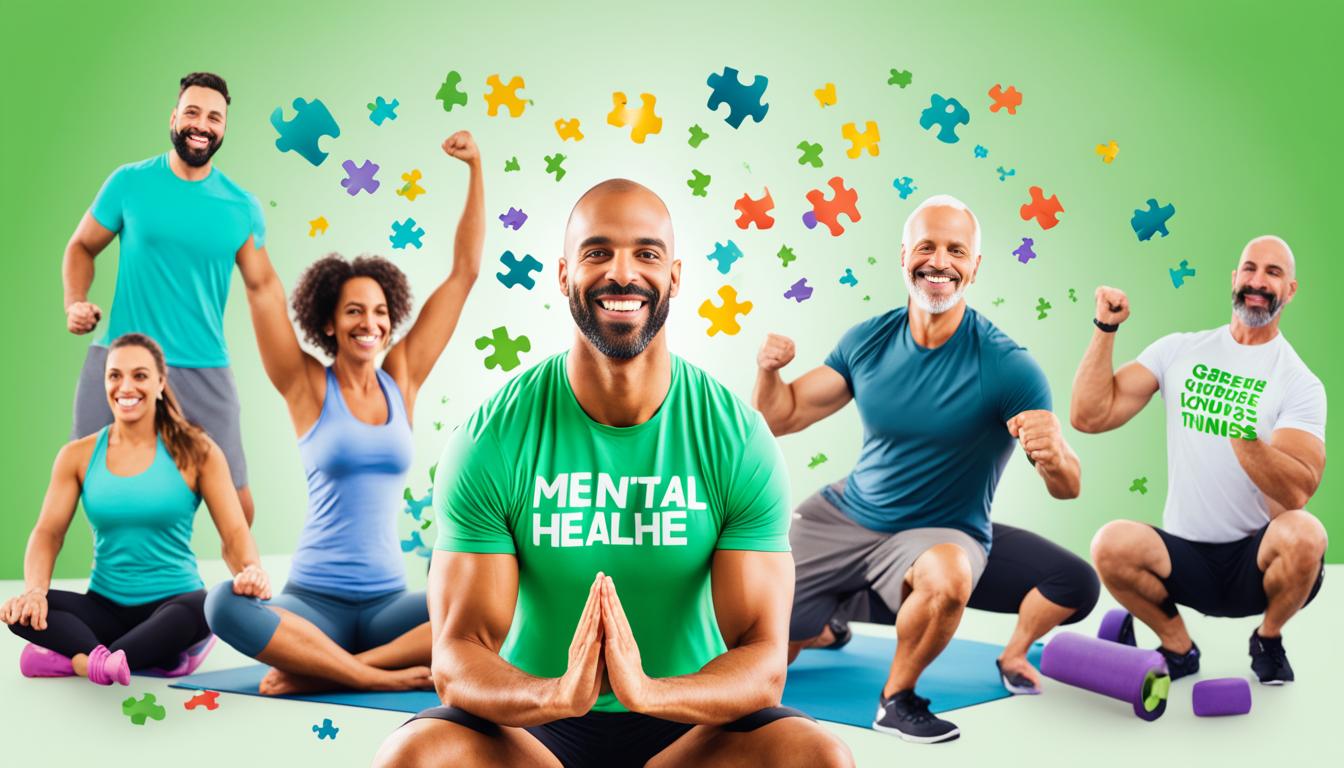Did you know that 41.5% of people get motivated to work out by fitness influencers on social media? Gender also plays a big part in this effect1. This shows how big of an impact social media has on fitness, especially in mental health groups.
Today, social media touches every part of our lives. Sites like Instagram, TikTok, and YouTube are key in sharing info and building online wellness groups. They mix user content with tips from fitness stars, helping spread mental and physical health.
These platforms let people connect and support each other in fitness groups. You can find lots of resources, motivation, and a sense of belonging. During the COVID-19 pandemic, 63.4% of people turned to social media for workout advice1. This shows how vital these platforms are for staying fit and mentally well.
Looking deeper, social media and mental health groups have both good and bad sides. By understanding this, you can use these online spaces to improve your mental and physical health.
Introduction to Social Media and Mental Health Fitness Groups
Social media fitness communities have changed the way we seek wellness advice. These platforms let people share their health and fitness stories. They create a space for support and accountability, helping your mental health advocacy.
Research shows a link between too much social media and less physical activity2. But, social media can also help you stay active and healthy if used wisely2. Joining wellness online groups can motivate you to stick with your exercise plans2.
A study from the University of Pennsylvania found that limiting social media to 30 minutes a day can make you feel better2. Even though social media can make you feel bad by showing perfect lives, it can also help you stay on track with fitness goals2.
About 38% of people worldwide use platforms like Facebook, Instagram, and WhatsApp3. While scrolling mindlessly can make teens feel worse, actively engaging on social media doesn’t hurt your mental health4.
Talking openly with parents about tech use helps teens stay mentally healthy4. This shows how important it is to use social media wisely in wellness groups. It greatly helps your mental and physical health.
The Influence of Social Media on Mental Health
Social media has a big effect on our mental health, with both good and bad sides. Knowing these effects helps us use social media better.
Positive Impacts
Social media helps create social support online networks5. These networks let users share their fitness wins, get support, and talk about mental health. This makes people feel like they belong and get validation from others. It’s key for boosting fitness motivation and staying on track with health goals.

Also, social media gives people access to important info on mental health and fitness. This helps users make better choices for their well-being.
| Positive Impacts | Details |
|---|---|
| Social Support | Encouragement and validation from peers |
| Discussions | Engagement in mental health conversations |
| Accountability | Increased motivation to stay active and healthy |
Negative Impacts
But, social media also has big downsides. It can lead to social media addiction, especially in young people. For example, in Saudi Arabia, almost all young people use social networking sites5. Spending too much time on these platforms can make people dependent and less productive, cutting down on real-life social time6.
Another bad effect is feeling bad when comparing ourselves to others online. Social media can make people feel not good enough, leading to low self-esteem and anxiety6. This gets worse when people see unrealistic fitness standards online. In Saudi Arabia, getting likes, comments, and followers can hurt mental health, showing how these online interactions affect us5.
| Negative Impacts | Details |
|---|---|
| Addiction | Dependency on social media, reducing offline interactions |
| Comparison | Feelings of inadequacy and anxiety due to peer comparison |
| Unrealistic Standards | Impact on body image and mental wellness |
The Role of Social Media in Mental Health Fitness Communities
Social media has changed how we connect with mental health support groups. Over 97% of teens and young adults with mental health issues use social media a lot. These platforms are key for online wellness support7. About 70% of people getting help for serious mental health issues also use these digital spaces7.
Social media lets us share tips on mental health fitness. For instance, 98% of teens aged 13-18 from mental health centers use social media. YouTube, Instagram, and Snapchat are their top choices7. This shows a big chance to spread reliable health info and keep people updated on mental health.

Social media does more than share info; it helps build support groups. A 2015 study found nearly half of those in mental health care use social media, especially the young ones7. Sites like Facebook, Instagram, and Twitter let people with similar mental health concerns connect. They offer emotional support and a feeling of belonging.
But, using social media comes with its challenges. While it has many benefits, too much use can lead to more depression, anxiety, and feeling lonely8. A study from the University of Pennsylvania showed that being very active on Facebook, Snapchat, and Instagram can make people feel lonelier8. So, it’s important to use these platforms wisely to get the most good out of them.
| Age Group | Usage Rate | Platform Preference |
|---|---|---|
| Adolescents (13-18) | 98% | YouTube, Instagram, Snapchat |
| Middle-aged and Older | 70-79% | Facebook, WhatsApp |
| General Population | 70-97% | Varied |
Benefits of Fitness Influencers
Following fitness influencers on social media can be a great way to get motivated and inspired. They share their own health stories and successes, which encourages people to live healthier. These influencers inspire others by showing how they changed their lives for the better.
Studies show that people often follow the fitness tips and diets shared by influencers. This leads to big changes in their lives9.
Motivation and Inspiration
Fitness influencers are key in motivating their followers with real health stories and achievements. These stories make people feel connected and push them to set fitness goals. The World Health Organization says being active is key to feeling good overall9.
The European Commission also stresses the importance of staying active9. Fitness influencers share workout tips and success stories to help people turn their goals into action. This creates a community that supports fitness and health10.
Accessibility of Information
Fitness influencers make health and wellness info easy to find online. They share tips on workouts, nutrition, and mental health. This info is for everyone, no matter their background or fitness level11.
Research shows that social media affects how people engage with health topics10. Influencers’ trust and knowledge also shape people’s views on exercise and diet. This makes their advice more valuable10.
In conclusion, fitness influencers help people make big health changes. They offer motivation, inspiration, and easy-to-use info. By following them, people can join a supportive online space that promotes better health choices11.



